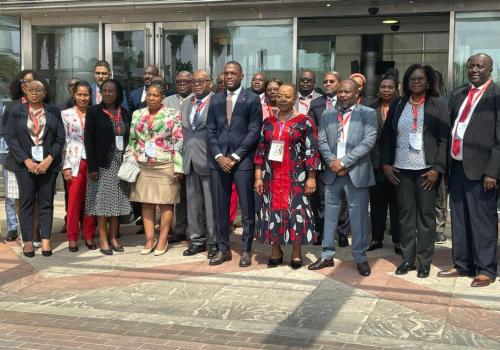SADC Statistics Committee Meets to Review Progress on Regional Statistical Programmes
The Southern African Development Community (SADC) Statistics Committee has convened in Luanda, Republic of Angola, from 28-30 May 2024, to evaluate the progress of regional statistical activities.
The meeting was officially opened today by Honourable Secretary of State for Public Investment, Ivan dos Santos of Angola, who underscored the crucial role of statistics in regional development.
In his opening remarks, Hon. Santos announced that Angola will conduct its first digitalized census on 19th July 2024, marking a significant milestone in modernizing the country’s statistical infrastructure.
Ms. Angele Makombo N’Tumba, SADC Deputy Executive Secretary for Regional Integration, expressed sincere gratitude to Angola for hosting the meeting and praised the technical and professional contributions from the statistical offices of SADC Member States.
She also acknowledged the presence of esteemed partners, including the International Labour Organization (ILO) and the International Organization for Migration (IOM), highlighting their collaborative efforts in enhancing regional statistical capabilities.
In her address, Ms. N’Tumba highlighted the importance of the SADC Regional Indicative Strategic Development Plan (RISDP) 2020-2030, which serves as a roadmap for decision-making and planning across the region.
She commended the resilience of the statistics offices in the SADC member states, which continue to operate effectively despite challenges such as climate change, including the impact of El Niño-induced droughts and floods.
These challenges have complicated activities like census-taking, but the modernization of data collection and swift access to social and economic data have significantly improved public service planning.
The meeting will also review progress on the SADC Protocol on Statistics, focusing on the signing and ratification of the protocol by Member States, the SADC – World Bank Regional Statistics Project, and advancements in data sources and collection methods.
Embracing innovations and capacity building in statistics remains a priority to align with international standards and support SADC’s Vision 2050.
Ms. N’Tumba emphasized that the committee’s efforts in overseeing data collection and utilization are crucial for making informed policy decisions.
These efforts drive the region’s goals of poverty reduction, sustainable development, and the creation of an inclusive, competitive, and economically liberated SADC Community.
The SADC Statistics Committee, which meets twice a year, aims to facilitate informed policy decisions by providing reliable and timely data.
The committee’s work is vital for reducing poverty through data-driven strategies and promoting sustainable development by implementing approaches that ensure long-term environmental and economic sustainability.
Additionally, the committee seeks to enhance economic competitiveness through accurate statistical analysis and ensure inclusivity and equity by supporting data collection and utilization that foster inclusive growth and equal opportunities for all SADC citizens.



